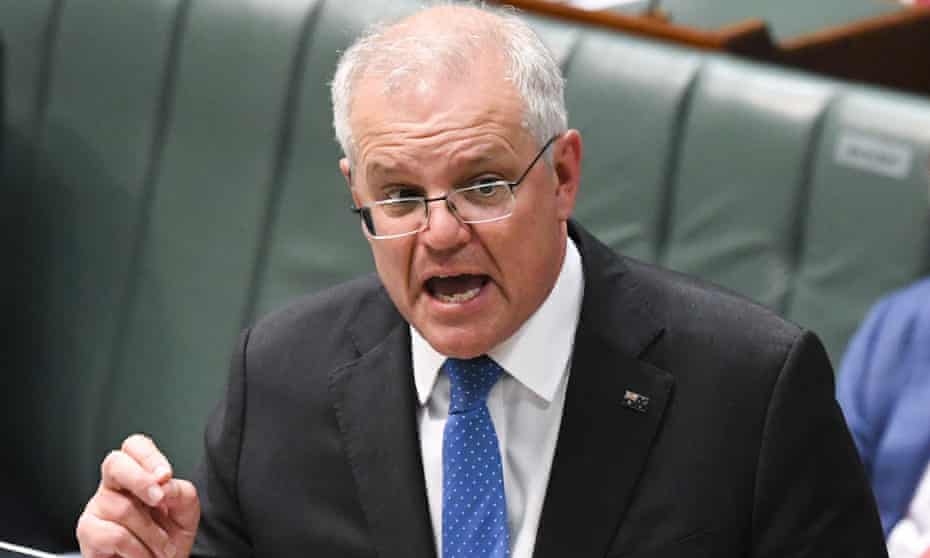Extract from The Guardian
Senate inquiry hears $4bn program amounted to ‘improper use of power’ which could be challenged in court.

Prime minister Scott Morrison. A Senate inquiry has heard the Coalition government’s commuter car parks scheme would ‘amount to corruption’ under a NSW-style integrity watchdog.
Last modified on Thu 11 Nov 2021 18.49 AEDT
The allocation of a $4bn fund that the Morrison government used for a controversial commuter car parks program would “amount to corruption” if a federal integrity commission existed, a former New South Wales auditor general has told a Senate inquiry.
Despite the strong criticism, the Senate hearing on Thursday also heard from officials that the government can spend the remaining $890m in the urban congestion fund (UCF) wherever it likes, raising the prospect of a similar cash splash ahead of the next federal election.
Tony Harris, the former NSW auditor general, said that under NSW law using public funds for electoral advantage would amount to corrupt conduct and applied this label to the car park fund, but the federal government lacks an integrity body to make such findings.
Chair of the Centre for Public Integrity, Anthony Whealy, told Thursday’s hearing of the finance and public administration references committee, that pork barrelling is “very serious” and a “misuse of public money”.
On Thursday infrastructure department officials conceded it was “unusual”, but the government was entitled to select project sites without departmental input, in part, because the $4.8bn fund was not a competitive grants program.
The comments raise concerns of further commitments being made regardless of merit, with Labor complaining the Coalition created 22 discretionary funds in the last budget from which to deliver money.
In June the Australian National Audit Office released a scathing report on the $660m commuter car park element of the UCF, finding not one of the 47 sites promised by the Coalition at the 2019 election was selected by the department. Rather, sites were handpicked by the government on advice from its MPs and candidates.
The ANAO has said projects were approved by the prime minister, Scott Morrison, after then-urban infrastructure minister, Alan Tudge, instructed staff to first consult marginal seat MPs, leading to a list of top 20 marginals being drawn up.
Tudge has claimed he was “not aware” of the document, denied any wrongdoing and insisted projects were merit-based.

The infrastructure department deputy secretary, David Hallinan, told the hearing there was “usually” a role for the department in project selection and consultation “usually” occurs with a delivery partner first, such as a council or state government.
But with respect to the car parks the department “largely wasn’t involved in the project selection”, he said, which was “unusual”.
The first assistant secretary, Philip Smith, said the program was not a competitive grants program, but this did not mean it wasn’t merit-based.
Projects were selected by the government, some of which were announced as election commitments, and then funded after the 2019 election through the National Land Transport Act and national partnership agreements.
Asked if the decisions were appropriate, Smith responded that the government was entitled to select projects to be funded.
Of the total $4.8bn UCF, $890m remains unallocated. Smith said it was a “matter for government” how that money was spent, and officials could not guarantee they would have any role in its allocation.
Just four of the 47 car parks have been completed, with five under construction and a further seven to start construction this financial year.
Asked about the Doncaster project, which the ANAO assessed was ineligible for funding, Hallinan conceded the process had been “untidy” but the government is “looking how best to deliver that commitment”.

Hallinan said the project was only at the scoping and planning stage, and changes may be needed to authorise funding at the construction stage.
Despite that claim, Boyd said the project had already been approved for its full $6m cost in May 2020.
The deputy auditor general, Rona Mellor, said she couldn’t think of another example of a government retrospectively authorising such spending.
Boyd said the car park fund was driven not by “investment principles” such as departmental analysis about commuter needs but from an electoral analysis of the seats in which projects were located.
No comments:
Post a Comment